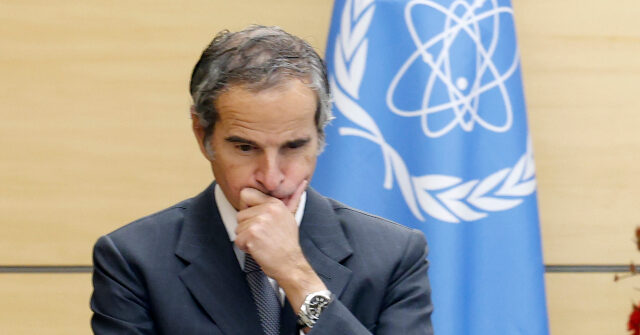International Atomic Energy Agency (IAEA) Director-General Rafael Grossi said on Sunday that Iran could conceivably resume enriching uranium in a “matter of months,” although he resisted putting an exact timetable on the resurrection of Tehran’s nuclear weapons program after U.S. and Israeli airstrikes.
As in most of his public appearances since becoming IAEA director in 2019, Grossi was torn between his absolute priority of encouraging more negotiations and the undeniable truth that Iran has been lying to his agency about its nuclear program. Almost every comment Grossi makes about Iran’s uranium enrichment program concludes with his insistence that only further negotiations can contain Tehran’s nuclear ambitions.
The problem is that Grossi has been pointing out Iran’s dishonesty about uranium traces found at undeclared sites for the entirety of his tenure as IAEA director — and he readily concedes that Iran is enriching uranium to dangerously high levels of purity that cannot be justified by any peaceful nuclear program. Endless negotiations with a dishonest regime that seems hell-bent on producing weapons-grade radioactive material are a dead end.
Grossi submitted a tough but fair report about Iran’s dishonesty to the IAEA board of governors this month, and the board proceeded to formally censure Iran for non-compliance with its obligations under the Nuclear Non-Proliferation Treaty (NPT) for the first time in two decades. Israeli airstrikes against Iran’s nuclear program began hours later.
The Iranians have accused him of collaborating with the Israeli and U.S. governments to manufacture a pretext for military action, and on Sunday, a hardline Iranian newspaper that supports Supreme Leader Ayatollah Ali Khamenei called for Grossi to be seized by the regime, tried, and executed.
Grossi has also been reluctant to tacitly endorse Israeli and U.S. military action by pronouncing Iran’s nuclear program dead and buried, but he clearly disagrees with those who claim the massive airstrikes ordered by President Donald Trump inflicted no real damage to Iran’s nuclear program.
Grossi said on Thursday that he believes the American airstrike inflicted “enormous damage” on Iran’s primary enrichment site at Fordow and the facility is “no longer operational.” This earned him the enmity of left-wing forces that wanted to portray Trump’s strikes as entirely ineffective.
Grossi sought to thread all of these needles in an interview with Margaret Brennan of CBS News on Sunday’s Face the Nation.
The IAEA director generally stuck to his position that precisely assessing the damage to Iran’s nuclear facilities is difficult, especially the deeply buried site at Fordow, but it was clear they suffered tremendous damage. He also maintained his insistence that military action could not completely eliminate Iran’s nuclear program, so all parties should return to the negotiating table over which his agency could preside.
“It’s clear that what happened in particular in Fordow, Natanz, Isfahan, where Iran used to have and still has, to some degree, capabilities in terms of treatment, conversion and enrichment of uranium have been destroyed to an important degree,” he said.
Grossi said the Iranians themselves are not fully qualified or equipped to “sift through the rubble and look at what is the exact degree of damage,” so “at some point, the IAEA will have to return.”
When Brennan noted that the Iranians are moving to suspend cooperation with the IAEA in the wake of the 12-Day War, and that Grossi himself appears to have been banned from entering the country, Grossi said he hoped the Iranians would continue to honor their obligations under the NPT and search for a “diplomatic solution.”
“An international treaty, of course, takes precedence. You cannot invoke an internal law not to abide with an international treaty,” he said, dismissing the Iranian parliament’s vote to withdraw from the NPT.
When Brennan brought up the political dispute in the United States over the effectiveness of U.S. airstrikes on Fordow, Grossi said that taking an “hourglass approach in weapons of mass destruction is not a good idea.”
“The capacities they have are there. They can have, you know, in a matter of months, I would say, a few cascades of centrifuges spinning and producing enriched uranium, or less than that,” he said.
Grossi went on to explain there was a difference between Iran getting a few centrifuges spinning again and restoring the ability to refine hundreds of pounds of uranium to near-weapons-grade levels that it possessed before the Israeli and American bombing campaigns. He also repeated his statements from last week that the IAEA does not know for certain what happened to the hundreds of pounds of enriched uranium in Iran’s stockpile.
Maj. Gen. Abdolrahim Mousavi, chief of staff of the Iranian Armed Forces, voiced “serious doubts about the enemy’s commitment to its obligations, including the ceasefire” during a conversation with the defense minister of Saudi Arabia on Sunday.
Iran is trying to get the U.N. Security Council (UNSC) to condemn Israel and the United States as “initiators in the act of aggression,” while the United Arab Emirates wants Iran to make amends for launching a symbolic missile strike at territory in Qatar, so Tehran can “restore trust with its Gulf neighbors.”
U.S. Secretary of State Marco Rubio on Sunday condemned the Iranian newspaper that threatened Grossi.
“Calls in Iran for the arrest and execution of IAEA Director General Grossi are unacceptable and should be condemned,” Rubio said.
“We support the IAEA’s critical verification and monitoring efforts in Iran and commend the Director General and the IAEA for their dedication and professionalism. We call on Iran to provide for the safety and security of IAEA personnel,” he said.
Read the full article here


